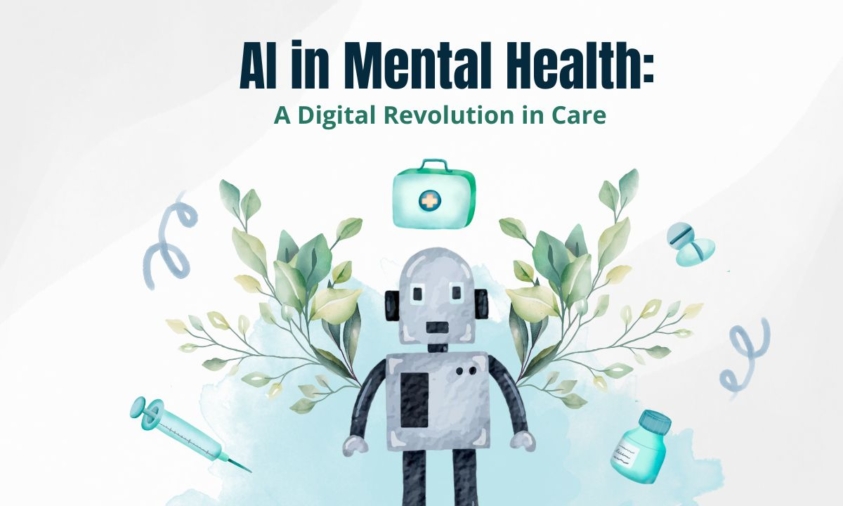Discover how AI is revolutionizing mental healthcare with predictive analytics, chatbots, and real-time monitoring while addressing ethical and regulatory challenges.
FOREWORD
The use of artificial intelligence (AI) in mental healthcare is only one of the many industries where it has become a game-changer. With applications including the early detection of mental health issues, individualized treatment programs, and AI-driven virtual therapists, current trends demonstrate AI’s transformational potential. Ethical concerns about privacy, bias reduction, and maintaining the human element in therapy, however, accompany these developments. The growing need for freely accessible, reasonably priced, and readily expandable mental health treatments is not adequately met by the traditional strategy, which mostly depends on in-person consultations and therapies. This discrepancy between the supply and demand for mental health services emphasizes how urgently creative solutions are needed.
HEALING MINDS WITH AI: INTEGRATING TECHNOLOGY INTO MENTAL HEALTHCARE
As per a WHO report, more than 150 million persons in the WHO European Region suffered from a mental illness in 2021. In recent years, the COVID-19 epidemic has exacerbated the situation. Let’s examine a few examples of how this ground-breaking technology is already being applied to enhance patient outcomes and transform lives for a range of mental health issues.
Chatbots
Chatbots are being utilized more and more to provide mental health patients with guidance and a channel of communication during their therapy. In addition to keeping an eye out for keywords that can lead to a referral and direct communication with a human mental healthcare practitioner, they can assist in coping with symptoms.
Woebot is an example of a therapeutic chatbot that may learn to fit the personalities of its users and guide them through various therapies and talking exercises that are frequently used to help patients learn how to manage a range of diseases.
Real-Time Monitoring and Predictive Intervention
Some AI mental health solutions operate as wearables that employ sensors to analyze body signals and intervene when assistance is required, rather than waiting for a user to engage with them through an app.
In order to evaluate the user’s emotional and mental state, Biobeat gathers data on their sleeping habits, level of physical activity, and changes in heart rate and rhythm. Predictive alerts about when action might be required are generated by comparing this data with anonymised and aggregated data from other users. After that, users can change the way they behave or, if they think it’s essential, seek help from healthcare professionals.
Advancing Patient Care with Predictive Health Analytics
In order to identify warning signals of mental health issues before they worsen to an acute state, AI can also be used to evaluate patient medical data, behavioural data, voice recordings from phone calls to intervention services, and a variety of other data sources.
Additionally, AI has been used to forecast which patients are more likely to benefit from cognitive behavioural treatment (CBT) and, as a result, be less likely to need medication.
AI-Driven Patient Monitoring and Intervention
In order to facilitate manual interventions, AI can be used to identify when a patient is likely to become non-compliant and either remind them or notify their healthcare providers. This can be accomplished using automated phone calls, emails, SMS, and chatbots like the ones previously described. Additionally, algorithms are able to recognize behavioural patterns or life events that are likely to lead to non-compliance.
CHALLENGES
- AI Bias: The inaccuracies or imbalances in the datasets used to train algorithms could perpetuate unreliable predictions or perpetuate social prejudice.
- Unexplored Areas in AI Applications: As per the WHO report the usage of AI applications in mental health research is imbalanced and mostly focused on studying psychotic disorders, schizophrenia, and depression. This suggests that we still don’t fully grasp how they can be applied to research other mental health issues.
- Lack of Transparency: The methodological errors and lack of transparency are troubling because they impede the safe and effective application of AI. Additionally, data is frequently not maintained effectively, and data engineering for AI models appears to be disregarded or misinterpreted.
- Lack of Regulatory Framework: The lack of precise and thorough legal frameworks controlling AI’s application in mental health is one of the main issues facing the industry. AI-driven technologies are more likely to adhere to proper standards when there are clear safety and efficacy requirements and recommendations.
- Lack of Human Touch: An important ethical consideration is preserving the human element in therapy while using AI as a tool. The therapeutic alliance between patients and therapists should be strengthened by AI, not replaced. It’s critical to strike the correct mix between human care and AI-driven solutions.
WAY FORWARD
To fully realize AI’s promise in enhancing mental healthcare, it is imperative to engage in ongoing research and development, ensure model validation and transparency, and establish strong regulatory frameworks. These initiatives will be crucial in determining how mental health therapy develops in the future, making it more ethical, accessible, and useful for people as AI technologies advance. Thorough testing and validation procedures are required to guarantee the accuracy, dependability, and patient safety of AI-driven therapies.
Authored by Tanvi Ojha, Legal Intern


 Cart is empty
Cart is empty 
